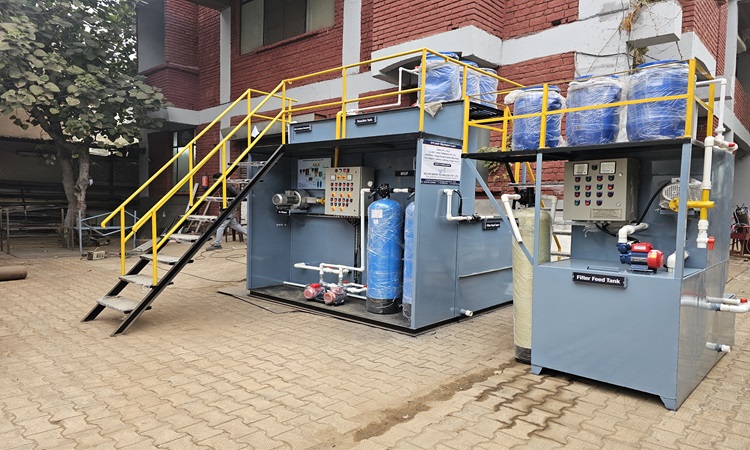ETP Plant Manufacturer In India

What is an Effluent Treatment Plant (ETP)?
An Effluent Treatment Plant is a system designed to treat industrial wastewater before it is discharged into the environment or reused. Many industries, such as textile, pharmaceutical, food processing, and chemical manufacturing, generate wastewater that contains harmful contaminants like oils, grease, heavy metals, and toxic chemicals. ETPs help remove these pollutants, ensuring that water is treated properly to meet environmental regulations.
Major Advantages of Effluent Treatment Plants
1. Pollution Control – ETPs help industries reduce pollution by removing harmful chemicals from wastewater before releasing it into the environment.
2. Compliance with Regulations – Industries must follow strict environmental laws, and an ETP ensures compliance with pollution control standards.
3. Water Reuse & Conservation – Treated water reused for industrial processes, cooling, and gardening, helping save water.
4. Prevention of Health Hazards – Proper wastewater treatment prevents the spread of diseases and protects human health.
5. Improved Corporate Image – Industries that follow eco-friendly practices gain public trust and a positive reputation.
6. Cost Savings – Recycling treated water reduces the need for fresh water and lowers water bills.
7. Protection of Aquatic Life – By reducing water pollution, ETPs help protect rivers, lakes, and marine ecosystems.
Process of Effluent Treatment Plants
ETPs follow a step-by-step treatment process to remove contaminants from industrial wastewater. The main stages include:
1. Preliminary Treatment (Physical Treatment)
- Screening: Removes large solids, debris, and floating materials.
- Grit Removal: Separates heavy particles like sand, gravel, and dirt.
- Oil & Grease Removal: Removes floating oils and fats from the wastewater.
2. Primary Treatment (Settling & Chemical Treatment)
- Sedimentation: Suspended solids settle at the bottom of the tank.
- Coagulation & Flocculation: Chemicals like alum and ferric chloride added to help tiny particles clump together and settle.
- Neutralization: pH levels adjusted to ensure the water is neither too acidic nor too alkaline.
3. Secondary Treatment (Biological Treatment)
- Aeration Tank: Microorganisms break down organic pollutants in the presence of oxygen.
- Activated Sludge Process: Bacteria feed on contaminants, converting them into harmless byproducts.
- Clarification: The treated water separated from the sludge (biological waste).
4. Tertiary Treatment (Advanced Filtration & Disinfection)
- Sand & Carbon Filtration: Removes fine particles, chemicals, and odours.
- Membrane Filtration (Reverse Osmosis): Further purifies water by removing dissolved salts and impurities.
- Disinfection: Chlorination or UV treatment eliminates any remaining bacteria and pathogens.
5. Sludge Treatment & Disposal
- The sludge collected during primary and secondary treatment is processed further.
- It is dewatered, dried, and sometimes used as fertilizer or safely disposed of in landfills.
Industrial Based ETP Plants
1. Chemical Effluent Treatment Plant – Used in industries like pharmaceuticals, textiles, and chemicals, this type removes harmful contaminants using chemical processes such as coagulation, flocculation, and neutralization. It is effective in treating wastewater with toxic chemicals and heavy metals.
2. Biological Effluent Treatment Plant – Commonly used in food processing, dairy, and municipal wastewater treatment, this type relies on bacteria and microorganisms to break down organic pollutants. It includes aerobic and anaerobic treatment methods for efficient purification.
3. Common Effluent Treatment Plant (CETP) – Designed for industrial clusters and small-scale industries, CETPs collect wastewater from multiple industries and treat it at a centralized facility. This is a cost-effective solution for industries that cannot afford individual ETPs.
4. Zero Liquid Discharge (ZLD) Effluent Treatment Plant – Used in power plants, textile industries, and refineries, ZLD ensures that no liquid waste discharged into the environment. It utilizes processes like reverse osmosis (RO) and evaporation to recover and reuse water, making it an eco-friendly option.
5. Membrane-Based Effluent Treatment Plant – This type widely used in pharmaceutical, electronics, and chemical industries, where high-purity water recovery needed. It employs advanced filtration methods such as reverse osmosis (RO), ultrafiltration (UF), and nanofiltration (NF) to remove fine particles and dissolved salts.
6. Activated Sludge Process (ASP) Effluent Treatment Plant – Common in municipal wastewater treatment, breweries, and tanneries, this system uses an aeration tank where microorganisms decompose organic waste. The treated water is then separated from sludge for further filtration.
7. Constructed Wetland Effluent Treatment Plant – Suitable for eco-friendly industries, hotels, and agricultural wastewater treatment, this system mimics natural wetlands to purify water. It uses plants, soil, and microorganisms to filter and remove pollutants from wastewater in an environmentally sustainable way.
Advanced ETP Plants Service Provider
Kelvin Water Technologies is a prominent provider of advanced ETP Plant Manufacturer in India, specializing in the design, manufacturing, and commissioning of wastewater treatment solutions for various industries.
Customized Solutions: They offer tailored ETP designs to meet the specific requirements of different industrial sectors, ensuring optimal performance and compliance with environmental regulations.
Advanced Technologies: Incorporation of cutting-edge treatment processes such as Membrane Bioreactor (MBR) technology enhances the efficiency and effectiveness of wastewater treatment.
Sustainability Focus: Their ETPs are designed to promote water recycling and reuse, aligning with sustainable practices and reducing the environmental footprint of industrial operations.
| To use our services right now, you can call us at +91-9812241001 or send us an email at info@kelvinindia.in We will be delighted to assist you! |